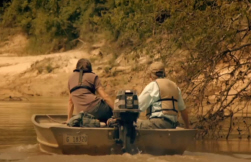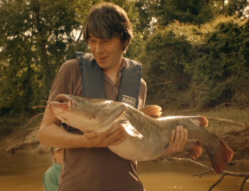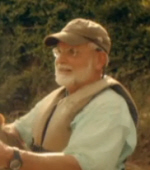Flathead Catfish
Don Jackson
What is Life?

Big Black River
This is the Big Black River, a tributary of the mighty Mississippi in America's deep south. And these dark and murky waters are home to a
ferocious predator. Even though it's impossible to see more than a couple of inches through the water, this predator has found a way to track
down and catch its prey with terrifying efficiency.
To help me catch one I've enlisted the support of wildlife biologist Don Jackson.
Don Jackson "I'll show you the mouth of this thing. So you can see what the prey sees when he comes. Anything that'll fit in that mouth, he'll grab it!"
This is the top predator in this river. This is a, what? A 25-pound flathead catfish. You see those for protrusions from his head? Those are
barbels. They sense a vibration in the mud, on the river bed, but the most interesting thing about the catfish is that she really is, in some
ways, one big tongue. There are taste sensors covering every part of her body, and she can build up a 3-D picture of the river by detecting
the chemical scents of animals.

Flathead Catfish

Don Jackson
So, her eyes are not much use. As you can see, this river is extremely muddy, but it's the sense of taste that does the job of building up a
picture of the world, and that's how she hunts, and she weighs a ton. The sensory world of the catfish is a remarkable one. Its map of its
universe is built from the thousands of chemicals which it can detect in the water. A swirling mix of tastes and concentrations, flavours
and gradients. It's a world we can hardly imagine.
There is an interesting almost philosophical point here because it's easy to imagine that we humans perceive the world in some kind of
objective way, but that's not the case at all. Think about the catfish. The catfish sees the world as a kind of swarm of chemicals in the
river, or vibrations on the river bed, whereas we see the world as reflected light off the forest, and I can hear the sounds of animals
out there somewhere in the undergrowth.
The catfish sees the world completely differently. So the way you perceive the world is determined by
your environment, and no two animals see the world in the same way.
Like every animal, we have evolved the senses that enable us to live in our environment.
But as well as equipping us for the present, those senses can also tell us about our past.
Now we have a sense of touch like the Paramecium, and we have the chemical senses, taste and smell, like the catfish, but for us, the dominant
senses are hearing and sight, and to understand them, we first have to understand their evolutionary history.


